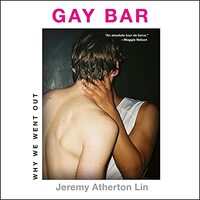You need to sign in or sign up before continuing.
Take a photo of a barcode or cover
medium-paced
emotional
informative
inspiring
lighthearted
reflective
medium-paced
funny
informative
reflective
slow-paced
challenging
funny
informative
reflective
slow-paced
emotional
funny
fast-paced
informative
fast-paced
Imma be honest I had the audiobook on 2.5 speed while I was doing other things so I properly did not take in as much of this as I would have liked to but oh well.
Elegy in a queer safe space: initially a bit difficult to love with its torrent of over-engineered Americanisms, Gay Bar grows on me as I warm to the personal as political and Jeremy Atherton Lin’s piss-elegant string of truisms disguised as a prose poem. I can’t help but end up liking a book that has as its title page image a grainy pic of a semi-gay (“mixed” in the old parlance) bar in the fading seaside resort I’ve recently returned to live in, or the series of tall tales about nights on the tiles and days on a comedown.
“It’s changing here, now that gay is accepted,” a comment by a Blackpool bar worker which forms the book’s basic premise, and the author flits with aplomb between UK and US, hardcore no-nelly meat rack in the hyperurban West Coast and provincial pub in seaside England.
What do we learn? “Gay people ‘emphasise exchange-value.’ In other words, their hype and flourish raise costs for everyone else.” So the coming of the bars means a civilising-sleazy influence but also rising house and coffee prices. And not everyone welcomed the increasing openness through consumerisation. The first Gay Shame, which organises an anti-Pride with no chants, colourful clothes or handholding and banners the size of business cards marching through remote, indifferent suburbs, “despaired at gays waving rainbow flags made in sweatshops.”
Lin describes the changing fashions, attitudes and bodies: “Social roles became harder to read, became roleplay. Gay liberation sold itself as a story of equality among men, a sexy democracy”, till we emerge in the modern era of abs, apps and fluidity, and the proverbial safe spaces. There’s an interesting sidebar on whether, when they’re disappearing faster than a queen’s g and t, gay pubs and clubs were ever the havens they are mythologised as; and whether the endemic racism not only marred but wiped out their claim to sanctity; now though one must “persist[..] through all the hoops an inclusive space erects these days.”
Is it worth it? Balancing personal history with sociological tract is a tricky thing to do and Lin doesn’t always quite manage it. Nonetheless this is readable, he comes across as likeable and humane despite the baggage of modern self-regard, and there’s the odd nugget for the completists that we’ve either forgotten or never knew. Oral - quite literally - history with a spoonful of sugar to help you go down.
“It’s changing here, now that gay is accepted,” a comment by a Blackpool bar worker which forms the book’s basic premise, and the author flits with aplomb between UK and US, hardcore no-nelly meat rack in the hyperurban West Coast and provincial pub in seaside England.
What do we learn? “Gay people ‘emphasise exchange-value.’ In other words, their hype and flourish raise costs for everyone else.” So the coming of the bars means a civilising-sleazy influence but also rising house and coffee prices. And not everyone welcomed the increasing openness through consumerisation. The first Gay Shame, which organises an anti-Pride with no chants, colourful clothes or handholding and banners the size of business cards marching through remote, indifferent suburbs, “despaired at gays waving rainbow flags made in sweatshops.”
Lin describes the changing fashions, attitudes and bodies: “Social roles became harder to read, became roleplay. Gay liberation sold itself as a story of equality among men, a sexy democracy”, till we emerge in the modern era of abs, apps and fluidity, and the proverbial safe spaces. There’s an interesting sidebar on whether, when they’re disappearing faster than a queen’s g and t, gay pubs and clubs were ever the havens they are mythologised as; and whether the endemic racism not only marred but wiped out their claim to sanctity; now though one must “persist[..] through all the hoops an inclusive space erects these days.”
Is it worth it? Balancing personal history with sociological tract is a tricky thing to do and Lin doesn’t always quite manage it. Nonetheless this is readable, he comes across as likeable and humane despite the baggage of modern self-regard, and there’s the odd nugget for the completists that we’ve either forgotten or never knew. Oral - quite literally - history with a spoonful of sugar to help you go down.
informative
inspiring
reflective
medium-paced
informative
reflective
sad
slow-paced
Too many pretentious quotes by other people. I found the audiobook hard to follow and kept having to rewind and listen to the same things again because his voice just wasn’t going into my head.





